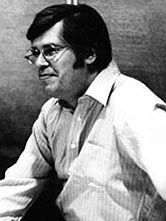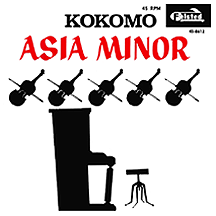KOKOMO
Asia Minor
Jimmy Wisner started a big, fat musical trend in the early 1960s that lasted...well, at least three months or so. Around the end of 1960, this pianist, who had a couple of jazz albums under his belt with bassist Ace Tesone and drummer Chick Kinney as The Jimmy Wisner Trio, came up with the idea to adapt a famous classical piece into a rockin' boogie-woogie-style piano number, garnished with swirling strings. The classic he chose was Edvard Grieg's 1868 "Piano Concerto in A Minor," which he retitled "Asia Minor."
Jimmy had a lot of connections in the music industry, including the people at Felsted Records, who'd released his jazz albums, but no one was game to take a chance on an idea like this (maybe they felt the classics shouldn't be messed with). Jimmy ended up releasing the single on his own label, Future Records, but to avoid tainting any reputation he had with jazz fans, he used the name Kokomo. The song, recorded on a well-worn upright piano with shellac on the hammers to achieve a punchier old-time sound, caught on quickly in early 1961, so Felsted, seizing the opportunity to cash in, went ahead and released the single for national distribution. The record spent the entire spring of '61 on the charts, hitting the top ten in April. It was also a hit in England, despite being banned by the BBC (maybe they felt the classics shouldn't be messed with).
When the record began getting airplay around February, imitators quickly made the scene. A group of L.A. studio musicians with Ernie Freeman on piano and other undetermined contributors, pounded out "Bumble Boogie," based on Nikolai Rimsky-Korsakov's often-used 1900 composition "Flight of the Bumblebee." The record came out under the logical group name B. Bumble and the Stingers. Right behind came Pacific Northwest band Paul Revere and the Raiders with their take on Sergei Rachmaninoff's softer 1892 creation "Prelude in C-Sharp Minor," done up louder and faster, retitled "Like, Long Hair." Both were top 40 hits within weeks of "Asia Minor." Ali Hassan, rumored to be one of B. Bumble's group, released, on Phil Spector's Philles label, an adaptation of "Malagueña" from Ernesto Lecuona's "Suite Andalucia," dating to 1927, but that one stalled. B. Bumble and the Stingers reappeared a year later to take the gimmick to the top 40 again with "Nut Rocker" from Tchaikovsky's classic 1892 "Nutcracker" ballet.

But it was Wisner who came out on top. His Kokomo record was the first, and biggest, in the classical-to-piano-rock cycle of '61-'62. Though he was unable to follow it up with another hit, "Asia Minor" marked a career turning point, raising his profile as a songwriter and producer. The acts whose songs he produced or arranged in the following years include many Cameo-Parkway label stars: Bobby Rydell, The Orlons, Don Covay, Chubby Checker, Dee Dee Sharp and ? and the Mysterians. These were followed by rock and soul artists including Neil Sedaka, The Innocence ("There's Got to Be a Word"), Jay and the Americans, Tommy James and the Shondells ("I Think We're Alone Now"), Jerry Butler ("Mr. Dream Merchant"), The Tokens, Spanky and Our Gang ("Sunday Will Never Be the Same"), Miriam Makeba ("Pata Pata"), Sam the Sham and the Pharaohs, The Cowsills ("The Rain, the Park and Other Things"), Peaches and Herb ("Love is Strange"), Jay and the Techniques ("Keep the Ball Rolling"), The Buckinghams, Tony Bennett, Alive and Kicking ("Tighter, Tighter") and Ronnie Dyson ("(If You Let Me Make Love to You Then) Why Can't I Touch You?"). His organ grinding in Freddy Cannon's hit "Palisades Park" made it stand out, and he arranged all of Len Barry's mid-'60s hits (most notably "1-2-3"). He became known in music industry circles as Jimmy "The Wiz" Wisner and surely he must have been, to take on so many top-rate acts in a relatively short span of time.
As a songwriter, he enjoyed some big hits: "Somewhere" by The Tymes (written with Norma Mendoza) and his most successful song, "Don't Throw Your Love Away" (a collaboration with Billy Jackson), first recorded by The Orlons in 1963, then remade a year later by The Searchers, becoming part of 1964's onslaught of British Invasion hits, reaching the top 20 in the U.S. and number one in England.
So the moral, for Jimmy Wisner anyway, is that you can risk the respect of jazz fans (and perhaps those who feel the classics shouldn't be messed with), by bangin' out a classical-makeover on an old piano, scoring one big hit, and as a result move on to greater success, more money and fun times working with many, many talented artists!


